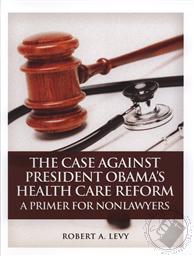The Case Against President Obama's Health Care Reform: A Primer for Nonlawyers (Book/ Paperback)
by Robert A. LevyProduct Overview
President Obama's most important piece of domestic legislation - the Patient Protection and Affordable Care Act - has been declared unconstitutional by several courts and will soon arrive at the Supreme Court for review. Its provisions contain a number of key constitutional complexities and this report concisely analyzes the positions of opponents and proponents of the Act, illustrating how key provisions are unconstitutional.
Multiple challenges to President Obama's health care reform are percolating through the federal courts. Soon the Supreme Court will be asked to weigh in on perhaps the most important question of the post-New Deal era: Are there any remaining limits on the breadth and scope of federal power?
Reinforced by decades of Court decisions that have gutted the Framers' original conception of limited government, the Obama administration has embraced an unprecedented expansion of centralized control. This paper addresses the Patient Protection and Affordable Care Act, which includes a mandate that individuals either purchase a government-prescribed health insurance policy or pay a penalty.
The Department of Health and Human Services has asserted three constitutional provisions as sources of authority for the mandate-the Taxing Power, the Commerce Clause, and the Necessary and Proper Clause. Each of those purported sources is deficient.
First, the penalty for not buying health insurance is not a tax. Even if the penalty were a tax, it would fail the constitutional requirements for income, excise, or direct taxes. Second, the power to regulate interstate commerce extends only to economic activities; it does not permit Congress to compel such activities in order to regulate them. Third, the mandate is not necessary; indeed, it is merely a means to circumvent problems that would not exist if not for PPACA itself. Nor is the mandate proper; it cannot be reconciled with the Framers' original design for a limited federal government of enumerated powers.
An essential aspect of liberty is the freedom not to participate. PPACA's directive that Americans buy an unwanted product from a private company debases individual liberty. And it's unconstitutional.
About the Author(s)
Robert A. Levy
Robert A. Levy is chairman of the Cato Institute's board of directors. He joined Cato as senior fellow in constitutional studies in 1997 after 25 years in business. He also sits on boards of the Institute for Justice, the Federalist Society, and the George Mason University School of Law. He founded CDA Investment Technologies, a major provider of financial information and software, and was its CEO until 1991. Levy clerked for Judge Royce C. Lamberth on the U.S. District Court in Washington, D.C., and for Judge Douglas H. Ginsburg on the U.S. Court of Appeals for the D.C. Circuit. From 1997 until 2004, Levy was an adjunct professor of law at Georgetown University. He has written numerous articles on investments, law, and public policy. His writing has appeared in the New York Times, Wall Street Journal, USA Today, Washington Post, National Review, and many other publications. Levy has also discussed public policy on national radio and TV programs, including ABC's Nightline, CNN's Crossfire, Fox's The O'Reilly Factor, MSNBC's Hardball, and NBC's Today Show. His latest book, co-authored with William Mellor, is The Dirty Dozen: How Twelve Supreme Court Cases Radically Expanded Government and Eroded Freedom. Levy received his Ph.D. in business from the American University and his J.D. degree from the George Mason University School of Law.
List Price: $10.00
Our Price: $7.59
You Save:
$2.41(24%)
+ Free Shipping w/ $45 min. purchase
Category: Civics
Format: Book (Paperback) (12)
Publisher: Cato Institute
Date Published: Apr 21, 2011
Language: English
SKU: LT-2346
Dimensions: 11.00 x 0.20 x 8.00 (in)
Weight: 3.20 oz










